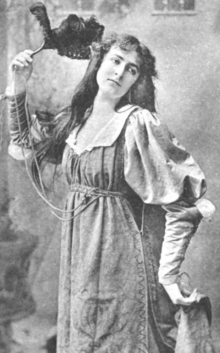Vera Beringer: Difference between revisions
start |
(No difference)
|
Revision as of 17:07, 28 August 2021
Vera Beringer | |
|---|---|
 Vera Beringer, from an 1896 publication | |
| Born | 2 March 1878 London |
| Died | 29 January 1964 Brighton |
| Occupation(s) | Actress, writer |
| Relatives | Esme Beringer (sister) |
Vera Beringer (2 March 1878 – 29 January 1964) was a British actress and writer. As a child she became well-known for playing Little Lord Fauntleroy on the London stage. Later she was a playwright, sometimes using the byline Henry Seton.
Early life
Vera Beringer was born in London,[1] the younger daughter of German-born composer Oscar Beringer and American-born novelist and playwright Aimée Daniell Beringer.[2] Her sister was actress Esme Beringer.[3] Her brother Guy Beringer was a journalist, credited with coining the word "brunch" in 1895.[4]
Career
Beringer became well-known in childhood for originating the role of Little Lord Fauntleroy on the London stage in 1888.[5][6] As a teen, she played Juliet to her sister's Romeo in a production of Romeo and Juliet.[7] Other stage appearances included roles in The Pillars of Society (1889),[8] The Prince and the Pauper (1890),[9] That Girl (1890), On a Doorstep (1890),[10] Holly Tree Inn (1891),[11] Richelieu (1896), Our Boys (1896),[12] The Pilgrim's Progress (1896),[13] My Lady's Orchard (1897),[14] A Warm Member (1898),[10] Shadows on the Blind (1898),[10] The Broken Melody (1902),[15] Warp and Woof (1904),[15] Fanny and the Servant Problem (1908),[1] The Whip (1910),[1] The Odd Woman (1912),[16] The Vision of Delight (1912),[16] The Absent-Minded Husband (1913),[16] The Morning Post (1913),[16] and The Man from Blankley's (1930). She played Gertrude to her sister's Hamlet in 1938, and the sisters gave further Shakespeare performances during World War II.[3]
Beringer wrote at least nineteen plays, often under the pen name "Henry Seton",[1][15][16][17] including The Boys (1908), False Dawn (1910, with Morley Roberts), Pierrot's Little Joke (1912), Three Common People (1912), A Penny Bunch (1912-1913), The Blue-Stocking (1913, with Mesley Down; an adaptation of Molière's Les Femmes Savantes),[18] Set a Thief (1915),[19] Lucky Jim (1915), Daring (1917), A Pair (1917), The Honourable Gertrude (1918), Biffy (1920, with William Ray), Beltane Night (1923), The Painted Lady (1924), Alice Thomas and Jane (1932), and House Full (1933). Her play Another Man's Life was adapted for television in 1957.
Lewis Carroll wrote a limerick titled "To Miss Vera Beringer".[20]
Personal life
Beringer lived in Hove in her later years, and died in 1964, aged 85 years, at a nursing home in Brighton.[3]
References
- ^ a b c d Who's who in the Theatre. Pitman. 1922. p. 63.
- ^ "Drama". The Academy and Literature. 52: 287. October 9, 1897.
- ^ a b c "Vera Beringer". Great War Theatre. Retrieved 2021-08-28.
{{cite web}}: CS1 maint: url-status (link) - ^ Rhodes, Jesse (May 6, 2011). "The Birth of Brunch: Where Did This Meal Come From Anyway?". Smithsonian Magazine. Retrieved 2021-08-28.
{{cite web}}: CS1 maint: url-status (link) - ^ Colclough, Dyan (2016-01-26). Child Labor in the British Victorian Entertainment Industry: 1875–1914. Springer. p. 80. ISBN 978-1-137-49603-4.
- ^ Carpenter, Angelica Shirley; Shirley, Jean (1990-01-01). Frances Hodgson Burnett: Beyond the Secret Garden. Twenty-First Century Books. p. 64. ISBN 978-0-8225-4905-5.
- ^ "A Lady Romeo". The Irish Playgoer and Amusement Record. 1: 18. December 14, 1899.
- ^ Franc, Miriam Alice (1919). Ibsen in England. Four Seas Company. p. 169.
- ^ Dramatic Notes: An Illustrated Year-book of Thestage. D. Bogue. October 1891. p. 195.
- ^ a b c Wearing, J. P. (2013-11-21). The London Stage 1890-1899: A Calendar of Productions, Performers, and Personnel. Scarecrow Press. pp. 8, 377, 394. ISBN 978-0-8108-9282-8.
- ^ Dramatic Notes: An Illustrated Year-book of Thestage. D. Bogue. January 1891. p. 15.
- ^ "Vera Beringer". The Era Annual. 1896. p. 29.
- ^ "The Pilgrim's Progress". The Theatre. 29: 101. February 1, 1897.
- ^ Archer, William (1898). The Theatrical "World" for ... Walter Scott, Limited. p. 275.
- ^ a b c Wearing, J. P. (2013). The London Stage 1900-1909: A Calendar of Productions, Performers, and Personnel. Scarecrow Press. pp. 86, 194, 422. ISBN 9780810892941.
- ^ a b c d e Wearing, J. P. (2013-12-19). The London Stage 1910-1919: A Calendar of Productions, Performers, and Personnel. Scarecrow Press. ISBN 978-0-8108-9300-9.
- ^ Gale, Maggie (2008-03-07). West End Women: Women and the London Stage 1918 - 1962. Routledge. p. 203. ISBN 978-1-134-88672-2.
- ^ Molière (1926). The Blue-stocking: Adapted by Vera Beringer and Mesley Down, from Molière's Comedy "Les Femmes Savantes". S. French, Limited.
- ^ "Set a Thief". Great War Theatre. Retrieved 2021-08-28.
{{cite web}}: CS1 maint: url-status (link) - ^ Beringer, To Miss Vera. "To Miss Vera Beringer by Lewis Carroll". AllPoetry. Retrieved 2021-08-28.
{{cite web}}: CS1 maint: url-status (link)
External links
- The National Portrait Gallery holds ten portraits of Vera Beringer
